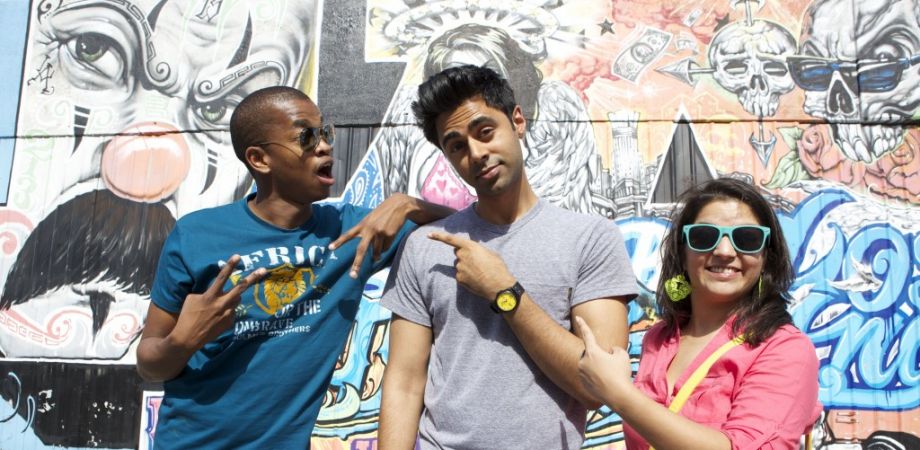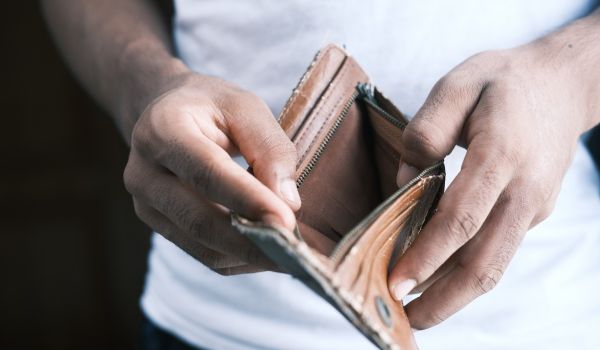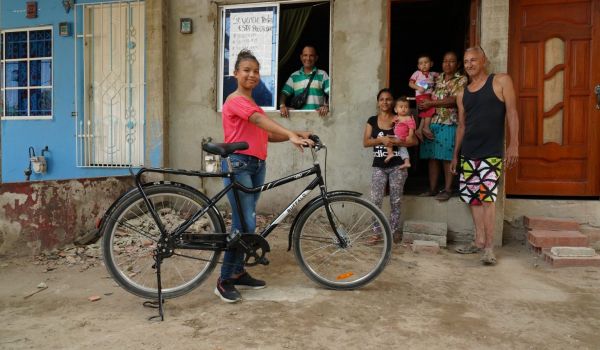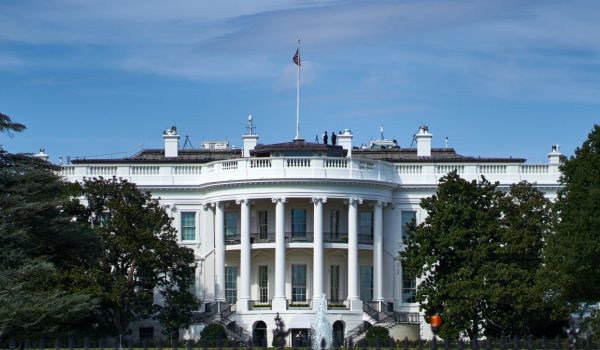Poverty, AIDS and sexism aren’t topics that generally leave a room in hysterics. But Aditi Mittal, one of the few female stand-up comedians on Mumbai’s burgeoning comedy scene, heads straight there, to what she calls the “truths” all around her. Mittal is one of several comedians from India and South Africa featured in a new two-part documentary, Stand Up Planet (SUP), which uses comedy to break the silence on some of the developing world’s most pressing issues.
The show, hosted by Indian-American comedian Hasan Minhaj, sets off to the developing world to meet leading comedians and understand their issues through a new lens. Minhaj believes that “you can tell a lot about people by the jokes they tell.” The show not only recasts global poverty in a new light, but provides links and opportunities for action through its website. In the end, just two comedians – one from each of the featured countries – are selected to go to L.A. to perform together in a live international comedy night. Mittal was one of the chosen two.
On stage at the Laugh Factory, Mittal observes the last time Indians were in a factory, “we were sewing buttons on a shirt.” She cracks on a new vaginal tightening cream, 18 Again, for older women, and recalls her morning commute on the Mumbai local train, where she witnessed slum-dwellers openly defecating along the tracks, “a thousand gleaming bums in the morning light.” The audience roars – they’ve seen it with their own eyes.
“I like to take on circumstances that are most uncomfortable,” says the trailblazing comic. “I poke and prod… It’s all about mindset change.” The punch lines are paving the way to new dialogues on issues that are divisive, sensitive or taboo. In South Africa, Kagiso Lediga, another comedian who Minhaj visits with in SUP, debuted his sketch-comedy program Pure Monate Show (PMS) in 1993 with jokes about apartheid – the first that had ever been spoken on TV. He says he could practically feel the collective sigh of relief. “As a black guy, we tend to blame apartheid a lot. You see a guy and ask what’s wrong. He says, ‘I have a headache. I think it’s apartheid,’” jokes Lediga at a gig. Lediga has used comedy to break the silence on many elephants in the room, like race, HIV and the country’s endemic violence.
“Laughter opens our ears and our hearts, and once people are listening who knows what they might be inspired to do?” says Wendy Hanamura, an executive producer on Stand Up Planet. “With the project’s unique ability to blend levity, reality and education on multiple platforms, our hope is that all Stand Up Planet audiences will find some of the world’s toughest problems a little more accessible, understandable and become agents of social change.”
There’s a growing movement in places such as India to discover new ways to communicate difficult themes. Many organizations are experimenting with street plays, art and digital media. Alex Heywood, founder of Kid Powered Media in Delhi, teaches children from slums to create films based on subjects that are important to them as kids, but are challenging to talk about with adults and family members. All driven by the youngsters themselves, the movies – complete with Bollywood-style dance routines and cameos by famous film stars – address issues of alcohol abuse, teacher absenteeism, domestic violence issues and gender awareness.
Heywood says there’s some liberty granted through the arts that allows different voices and ideas to enter these communities. “We’re not pointing fingers saying, ‘This is your kid doing drugs.’ We’re using characters to say these problems exist and to bring more awareness to them.”
In Mumbai, comedian Tanmay Bhat walks the narrow bylanes of Shivaji Nagar, one of Mumbai’s largest slums, with Minhaj, discussing the lack of basic amenities for the millions of slum-dwellers. He startles Minhaj with numbers: lack of sanitation kills 1,600 children in India every day. On stage, Bhat regularly uses his “54 percent joke,” a statistic that represents the percentage of the population without proper toilets. He salutes the sanitation issues as a clever national defense strategy. The rancid stench that permeates the city, says Bhat, is enough to keep anyone out.
“When I first heard Tamnay’s joke, it made me laugh, but it also made me listen,” says Minhaj on camera. “That’s not bad for a poop joke.” The host decides to “follow the joke” and investigate deeper. In SUP, the duo pays a visit to the local sanitation officer, and afterwards, to Deval Sanghavi, head of the strategic philanthropy firm Dasra, who further elaborates on the potential dangers of poor sanitation: girls drop out of school because few have toilets, and women are subjected to violence as they head out in the dark of night to find a hidden spot to relieve themselves.
In South Africa, comedian Mpho Popps – the other comedian selected by Minhaj to go to L.A. – gets laughs out of one of the most unlikely themes: HIV and what can be done to prevent it. Popps discusses condom use while fellow comedian Lediga dresses like a penis for an important but hilarious PSA to educate his audience on adult male circumcision. The procedure reduces the risk of male-to-female sexual HIV transmission by 60 percent, according to UNAIDS. Growing awareness has prompted two million voluntary medical male circumcisions in Eastern and Southern Africa since 2007.
At the beginning of SUP, Minhaj sets out to answer a question: Can comedy save the world? It might be a stretch, but what’s increasingly apparent through the show is that these emerging comics are playing a powerful role in giving a voice to voiceless subjects looming over their respective environments. If they’re not saving the world – a tall order for anyone, let alone emerging artists – they might just be challenging stigmas and outing taboos, and with that, even saving lives along the way.

Carlin Carr is an urban development professional interested in innovative ideas for social change.
















